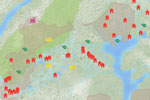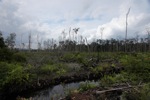Rainforest of the Danum Valley, Malaysia. Photo by: Rhett A. Butler.
For one month the Royal Society is offering a special theme issue of its Philosophical Transaction B journal on rainforest conservation for free. Entitled ‘The future of Southeast Asian rainforests in a changing landscape and climate’, the issue looks largely at studies conducted in Malaysian Borneo’s Danum Valley.
The issue includes a wide-range of studies, including comparing biodiversity in protected forests versus palm oil plantations, seed dispersal in fragmented forests, and in-depth looks at the chemistry of rainforests.
“Some of the key findings are: that conversion from forest to oil palm plantation can have dramatic effects on atmospheric chemistry and hydrology; that not only the size of remaining forest fragments matters, but also the distance between them, due to dispersal abilities of different species; and that there is a threat to the persistence and recovery of selectively-logged forests, because there is a lower seed production and a higher seed predation then in primary forest site,” reads an announcement from the Royal Society.
Another study in the issue recommends ways in which palm oil plantations could become more friendly to biodiversity.
The issue will be freely available online until December 31st.
Related articles
Community mapping of African rainforests could show way forward for preservation, REDD

(12/01/2011) A new initiative to place community mapping of central African rainforests online could prove key to local rights in the region, says the UK-based NGO Rainforest Foundation. Working with forest communities in five African countries, Rainforest Foundation has helped create digital maps of local forests, including use areas, parks, and threats such as logging and mining. The website, MappingForRights.org, includes interactive maps, photos, and video.
Global forest cover lower than previously estimated, says UN
(11/30/2011) Global forest cover, as well as forest loss, is lower than previously estimated by the Food and Agriculture Organization (FAO), according to a new satellite-based assessment that replaces the self-reporting system previously used by the U.N. agency.
Deforestation could be stopped by 2020

(11/28/2011) If governments commit to an international program to save forests known as REDD+, deforestation could be nearly zero in less than a decade, argues the Living Forests Report from the World Wide Fund for Nature (WWF). REDD+, which stands for Reduced Emissions from Deforestation and Degradation, is a program that would pay developing nations to preserve forests for their ability to sequester carbon. Government officials begin meeting tomorrow in Durban, South Africa for the 17th UN climate summit, and REDD+ will be among many topics discussed.







